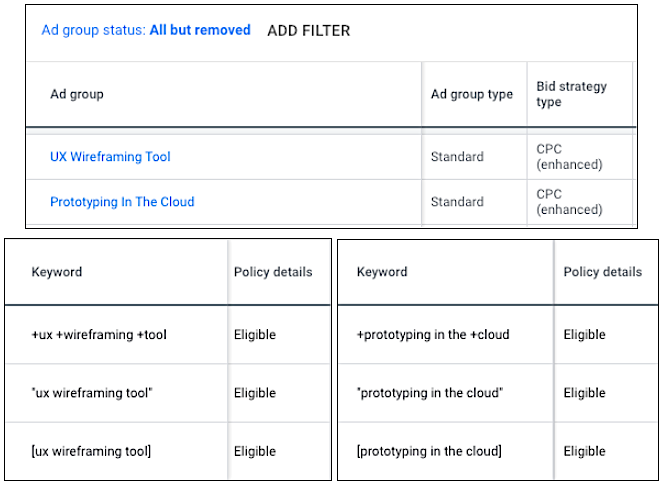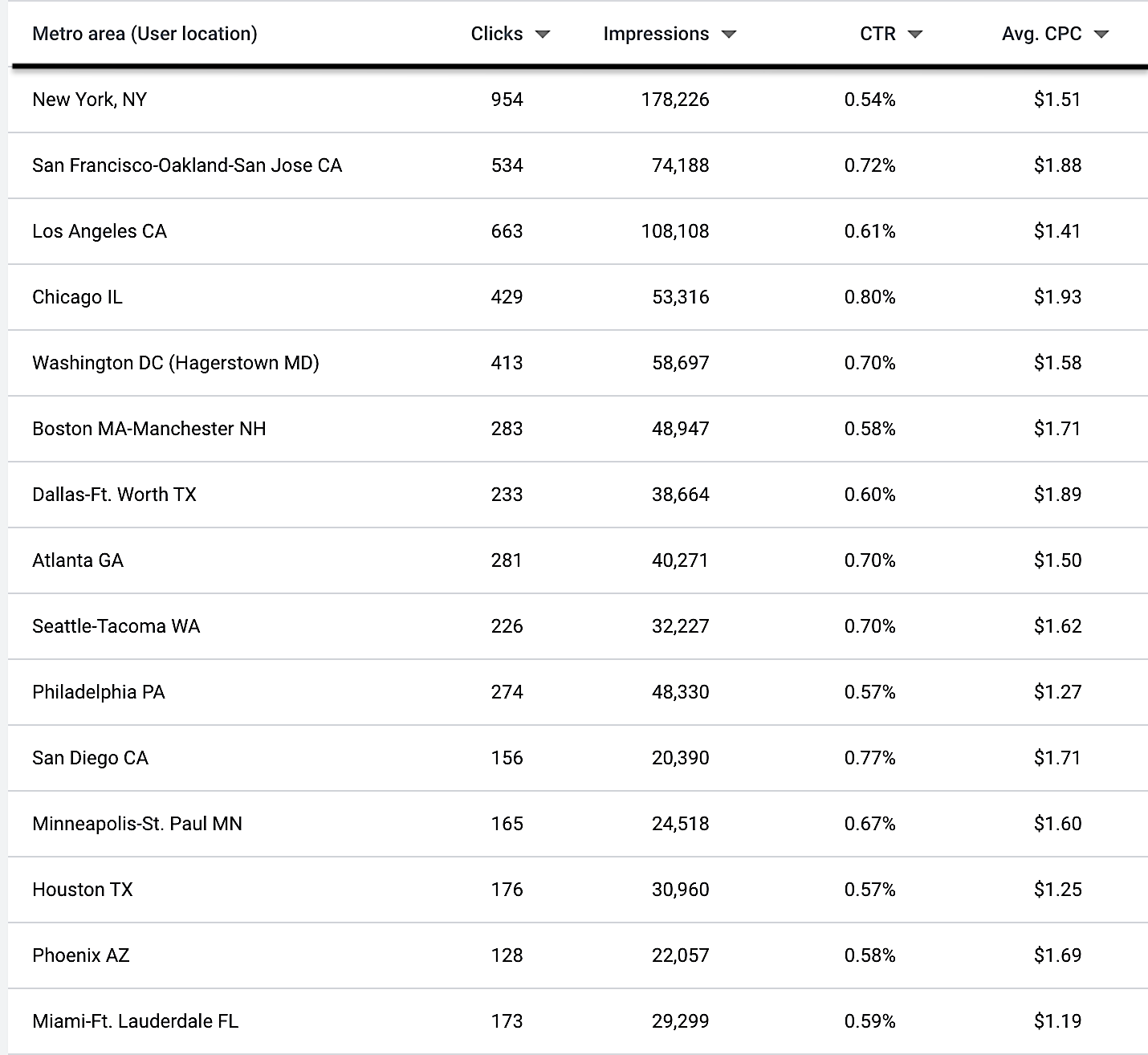When Axure first came to us, they were looking for an efficient way to generate B2B SaaS leads.
As a product-focused company, Axure was looking for an opportunity to partner with a paid advertising firm that would allow them to better focus on creating high-quality UX products for their customers.
For SaaS companies, one of the best customer acquisition tools is Google Ads, even though it can initially be expensive with CPC bids for software-related keywords as high as $100.
But many people don’t use the diverse range of Google reports that are available.
Through looking at the locations report, we immediately cut 33% of spend while maintaining a cost/conversion below their target goal of $16.
Results
This table compares cost, CTR and cost/conversion (leads in this case) from after we took over versus before:

It shows that costs decreased but CTR increased (due to more relevant targeting and better ad copy) and cost/conversion stayed roughly the same.
Want more qualified trials and demos from your PPC spend? We can help.
The Challenge: Axure Was Driving a Ton of Clicks — But Few Qualified SaaS Leads
Axure is a UX platform for creating wireframes and interactive prototypes without code. Their platform allows the collaboration needed to bridge the gaps between design, development, customers and your business. Spanning the globe and industries, Axure encourages UX designers, analysts, product managers, developers and user enthusiasts to push boundaries, together.
They were spending an aggressive amount on search advertising but failing to see the expected quality traffic that would later turn into a full purchase.
After an in-depth audit of Axure’s paid search account, we immediately spotted a few opportunities that we commonly see on B2B Google Ads accounts that result in inefficient lead generation.
Here are a few of these common missed opportunities:
- Lack of SaaS leads coming from targeting countries that were bringing in low-quality traffic
- Outdated account structure that wasn’t optimized to expand our coverage on high-converting keywords
- Low impression share and average position on their branded terms (meaning that their competition would often show up first in searches for their brand)
- Overly broad keywords that brought in low-converting traffic
- No clear process for adding their best terms from the Search Terms report as exact match SKAGs (Single Keyword Ad Groups)
SKAGs allow for more granularity and focus on individual keyword targeting. The overall structure relies on one keyword per ad group so that we can better establish the right ad and landing page experience behind the user’s intent.
The reason this works is because some companies have multiple products or solutions based on someone’s keyword intent. Instead of lumping all terms into one ad group, breaking out the ad groups by intent allows us to direct keywords to a relevant ad and landing page that answers their question. It also allows us more control over how the system bids towards our keywords.
For instance, we would want to pay more for someone looking at pricing information versus someone looking for a template or guide.
Let’s look at two relevant keywords: UX wireframing tool and prototyping in the cloud.
Axure has solutions for both of these products. However, we want to ensure that people end up in the right spot for a frictionless experience. Therefore, we’ve made two ad groups. One for “UX wireframing tool” queries and another to capture “prototyping in the cloud” queries. Each has their own unique ads that mirror the search intent and their own dedicated landing pages:

Want more qualified trials and demos from your PPC spend? We can help.
The Solution: Pruning Axure’s Google Account to Maximize Qualified SaaS Leads
Our first solution for Axure was to focus spend by only showing ads in top-performing countries.
After we pruned the account, Google Ads spend dropped by 30-40% while qualified leads remained steady.
By negating unqualified countries and through tactical improvements to the campaign, ad group and keyword structures, we are now pacing ~60% of original spend and maintaining a $10 cost per lead (target cost per lead is $16).
We also saw a brand term increase, which they weren’t targeting even though branded terms are typically low-hanging fruit.
This is from 3 months into our engagement:

Three months into our engagement, we boosted branded search impressions by 5,400% and drove 1,113 leads from branded search.
Through targeting higher quality non-branded terms in the first place, more users were coming back and converting into leads via branded search.
Finally, some of Axure’s biggest efficiencies came from location-based targeting. We implemented DMA targeting, which means that we’re able to target designated markets with greater control over how we bid.

More recently, we’ve started seeing great results from affinity audiences, in-market audiences, and custom intent audiences to bid even higher on B2B audiences that are likely to turn into qualified leads.
Happily, despite the difficulty of a global pandemic, Axure is doing well. From Elaine Gilruth, Marketing Director at Axure:
“Quantifiably, we’re seeing a lot of turmoil in our economy right now (with COVID-19), but we’ve been able to stay consistent with sales and leads.
We’ve been able to focus more on other areas of marketing so that we can better communicate our new features to our customers and overall impact to the UX industry.
We’ve also been able to leverage our reseller partners to handle our global expansion, which has been really great for business.”
Want more qualified trials and demos from your PPC spend? We can help.
Check out more of our case study content:
- Ecommerce Advertising Strategy: How We Doubled PPC Sales for ThinSlim Foods (with a 3X+ ROAS)
- How Adobe Does Marketing: A Case Study
- [Case Study] The Content Sprout Method: How to Use Strategic Content Marketing to Grow Your Traffic From 0 to Millions
- 13 Conversion Rate Optimization Case Studies
- Single Grain’s Case Studies



